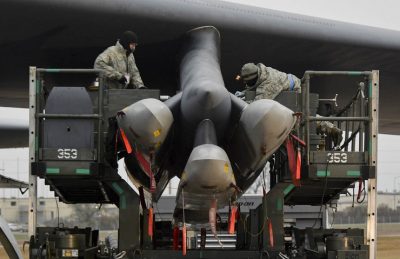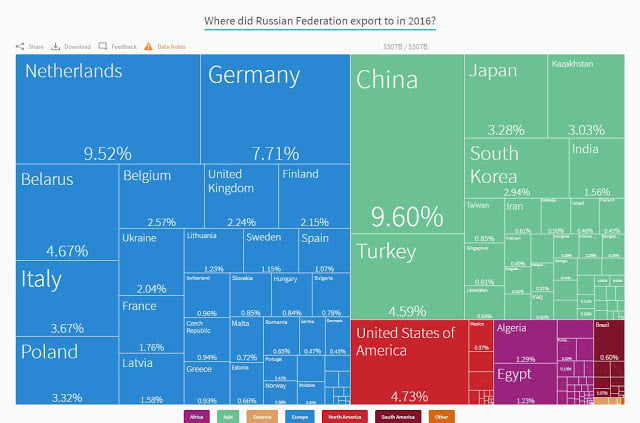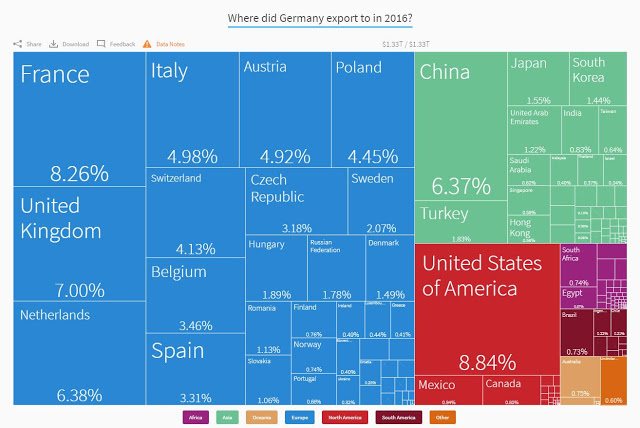Who Gains from Turning Europe into a Potential Nuclear Battlefield?

The United States and its NATO partners are attempting to make the case for Washington’s decision to abandon the Intermediate-Range Nuclear Forces (INF) Treaty.
Claims that the Russian Federation has been violating the treaty have yet to be substantiated with anything resembling credible evidence. Also missing is any rational explanation as to why Russia would develop or deploy nuclear weapons capable of launching a nuclear strike on Europe without warning – a scenario the INF Treaty was created to deter.
Bloomberg in its article, “Nuclear Fears Haunt Leaders With U.S.-Russian Arms Pact’s Demise,” would claim:
Jens Stoltenberg, NATO’s top civilian, cited recent Russian deployments and evoked a Cold War-style threat of nuclear destruction at a global conference of security and defense officials this weekend in Munich, the baroque German metropolis that’s one of Europe’s richest cities.
“These missiles are mobile, easy to hide and nuclear-capable,” Stoltenberg said. “They can reach European cities, like Munich, with little warning.”
Stoltenberg, the rest of NATO, Washington, and the many media organizations that work for and answer to both have failed categorically to explain why Russia would ever use nuclear-capable missiles against cities “like Munich, with little warning.”
Would Moscow Nuke Russia’s Closest Trade Partners?
While Russia has invested greatly in recent years to expand its economic trade with Asia, it is still heavily dependent on trade with Europe.
The Harvard Atlas of Economic Complexity reveals not only Europe as the most important region for Russian trade, particularly for Russian exports, but nations like the Netherlands, Germany, and Italy as among Russia’s top trade partners.
Russia is currently working with Germany on its Nord Stream 2 pipeline – a pipeline transporting Russian hydrocarbons to Western Europe without passing through politically unstable nations like Ukraine. The project is a keystone of recent Russian efforts to modernize and adapt its hydrocarbon industry around complications arising from US interference across Europe – particularly in the form of the US-engineered 2014 coup in Ukraine and NATO’s constant US-led expansion along Russian borders.
And Russian companies aren’t the only ones benefiting from Nord Stream 2 or other economic ties between Russia and Europe. Russia imports more from Germany than any other European nation, and Germany is only second to China among all nations Russia imports goods from.
It is highly unlikely Russia is going to launch nuclear missiles at “Munich, with little warning” – because to do so would be entirely without rational justification. Characters like Stoltenberg and the rest of NATO gloss over this obvious gap in their narrative to sell Russia as an unpredictable adversary and an enduring threat to Western Europe, as well as the United States. But by filling in this obvious gap in NATO’s logic, we can see who really benefits from turning Europe into a potential nuclear battlefield by stationing short-range nuclear weapons across the region.
Nuclear Battlefield Europe
It is Washington, not Germany nor Russia that opposes the Nord Stream 2 project. It is Washington who seeks to drive a wedge between Western European and Russian economic trade. It is Washington who seeks to galvanize – or coerce – Europe into a united front against Russia – even if it means compromising regional stability – both in terms of economics and security.
Washington – by withdrawing from the INF Treaty – doesn’t jeopardize the security of its own territory – but opens up a new dimension to an already ongoing nuclear arms race in the heart of Western Europe. It will be Western Europeans and Russians who face the consequences that emerge from the abandoning of the INF Treaty and any unpredictable – or even accidental – incidents that result from the stationing of short-range nuclear weapons across the region.
As pointed out many times before – NATO itself more than any external threat – represents the greatest danger to its member states in terms of pilfering national treasuries, miring nations in protracted wars and occupations thousands of miles from their own shores, and exposing member nations to the consequences of these wars including the deluge of refugees fleeing to Europe from them.
The US – by causing chaos and division both within Europe and between Europe and its trade partners – is able to continue exercising control over the continent – literally an ocean away from Washington DC.
The withdrawal from the INF Treaty and the dangerous arms race sure to follow is another example of the US playing the roles of arsonist and fire brigade as a means to maintain the relevance of the international order it constructed over the last century – an order the US serves as the self-appointed leader of.
In terms of simple economics and genuine European security – the United States could not be more irrelevant.
While Germany maintains the United States as its top export destination – the overall European and Asian regions by far contribute more to the German economy. Any instability or crisis in Europe would have an impact on the German economy its trade with the US would in no way compensate for. In terms of imports, the role of the US is even less.
While European trade with Russia is relatively small in comparison to inter-European trade, or with partners in Asia or even the US – Russian hydrocarbons serve an important role in European energy security. And while the cutting of ties between Europe and Russia would certainly hurt Russia more – the chaos used to cut those ties may disrupt stability within Europe itself – chaos that would impact inter-European trade – trade that ties with the US or Asia would not compensate for.
Washington plays a dangerous game, with short-range nuclear missiles being the latest point of leverage it seeks to use in prying Europe away from Russia. It is another illustration of just which nation’s government truly poses the greater threat not only to Europe, but to global peace, security and stability in general.
*
Note to readers: please click the share buttons below. Forward this article to your email lists. Crosspost on your blog site, internet forums. etc.
Tony Cartalucci is Bangkok-based geopolitical researcher and writer, especially for the online magazine “New Eastern Outlook” where this article was originally published. He is a frequent contributor to Global Research.
All images in this article are from the author
 “Towards a World War III Scenario: The Dangers of Nuclear War”
“Towards a World War III Scenario: The Dangers of Nuclear War”
by Michel Chossudovsky
Available to order from Global Research!
ISBN Number: 978-0-9737147-5-3
Year: 2012
Pages: 102
Print Edition: $10.25 (+ shipping and handling)
PDF Edition: $6.50 (sent directly to your email account!)
Michel Chossudovsky is Professor of Economics at the University of Ottawa and Director of the Centre for Research on Globalization (CRG), which hosts the critically acclaimed website www.globalresearch.ca . He is a contributor to the Encyclopedia Britannica. His writings have been translated into more than 20 languages.
Reviews
“This book is a ‘must’ resource – a richly documented and systematic diagnosis of the supremely pathological geo-strategic planning of US wars since ‘9-11’ against non-nuclear countries to seize their oil fields and resources under cover of ‘freedom and democracy’.”
–John McMurtry, Professor of Philosophy, Guelph University
“In a world where engineered, pre-emptive, or more fashionably “humanitarian” wars of aggression have become the norm, this challenging book may be our final wake-up call.”
-Denis Halliday, Former Assistant Secretary General of the United Nations
Michel Chossudovsky exposes the insanity of our privatized war machine. Iran is being targeted with nuclear weapons as part of a war agenda built on distortions and lies for the purpose of private profit. The real aims are oil, financial hegemony and global control. The price could be nuclear holocaust. When weapons become the hottest export of the world’s only superpower, and diplomats work as salesmen for the defense industry, the whole world is recklessly endangered. If we must have a military, it belongs entirely in the public sector. No one should profit from mass death and destruction.
–Ellen Brown, author of ‘Web of Debt’ and president of the Public Banking Institute




